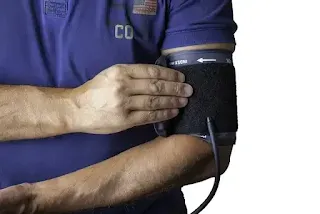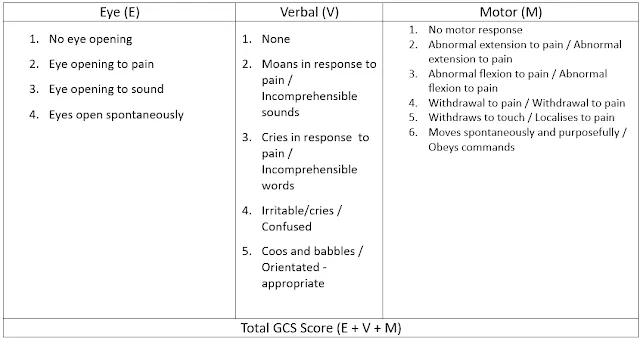Glasgow Coma Scale
In this article, we are going to see how check whether a
patient or a person is in coma or not using Glasgow coma scale (What ? Never
seen anyone walking and talking then, this article is for you). The Glasgow
Coma Scale (GCS) is a clinical tool or one may say a clinical scale which is
used to assess an individual's consciousness level following a brain injury.
This scale serves to "score" or quantify one's consciousness by
assigning numerical values based on factors such as wakefulness, awareness, and
responsiveness to simple instructions.
For that purpose, we first have to be familiar with the term- “Consciousness”. Some experts say that consciousness is everything that your mind experiences while others say that consciousness is awareness of one’s internal and external existence. And according to me, human consciousness is just action and reaction of humans to its surrounding and environment (don’t tell it anyone as my opinion never mattered and never will).
What is the purpose of Glasgow Coma Scale (GCS) ?
Well as said before the purpose of the Glasgow coma scale is used to measure the consciousness of any person in terms of his/her body movements and motion typically that of eye response, verbal response and motor response (movement of the body parts that are connected to the nerves, spinal cord and brain).
When is Glasgow Coma Scale (GCS) used ?
Healthcare professionals use the Glasgow Coma Scale (GCS) into a neurological examination. Its applicability extends to situations where there is a reduction in consciousness, encompassing injury-related conditions like concussions and traumatic brain injuries. Additionally, the scale proves valuable in assessing non-injury-related scenarios such as low blood sugar (hypoglycaemia), poisoning, or post-seizure events and medically induced coma, too.
How does Glasgow Coma Scale (GCS) work ?
An expert will accompany the patient and will ask questions
to him/her or take a medical test of the person and then according to the above
table assign score to the patient.
What do the Glasgow Coma Scale (GCS) score mean ?
Now, obviously we have to analyse the score or result, in
order to know the physical condition of the patient. Healthcare experts give
the score according to the above chart. The highest possible score that can be
given to a patient is 15, while the
lowest score that can be given to a patient is 3. A perfect score that
all my readers will be having is 15 which means that your perfectly fine and
good to go. You are awake, responsive and not at all have any problem regarding
your memory and thinking ability.
While if score given is equal to 8 and less than 8 which I
wish none of my reader should get and ever have indicates that the patient is
in a coma. Well, lower the
GCS score, the deeper the state of coma the patient will be in. Well, the expert will always showcase the result in form of – EaVbMc where,
- E stands for Eye response
- V stands for Verbal response
- M stands for Motor response
- a stands for score of Eye response of the patient
- b stands for score of Verbal response of the patient
- c stands for score of the Motor response of the patient
For example, the perfect score of 15 will given as E4V5M6
meaningly score for Eye response is 4, Score for verbal response is 5 and score
for motor response is 6 of that particular patient. While the worst score of 3
will be given as E1V1M1 indicating that score for Eye response is 1, Score for
verbal response is 1 and score for motor response is 1 of that particular
patient.
Conclusion
In summary, the Glasgow Coma Scale stands out as the commonly used tool used by healthcare professionals to measure reductions in consciousness and instances of coma. With nearly five decades since its inception, extensive studies by experts affirm its ongoing significance as a valuable diagnostic instrument. This tool aids healthcare providers in monitoring alterations in brain function, thereby facilitating targeted treatment and enhancing the care provided to individuals affected by conditions impacting their level of consciousness. I hope you have learned something new from this article and thank you for reading till last.
References : Here is the list of websites I would like to
give credits to, because of them is that I sharing the knowledge to you all so
they deserve it. Websites :



